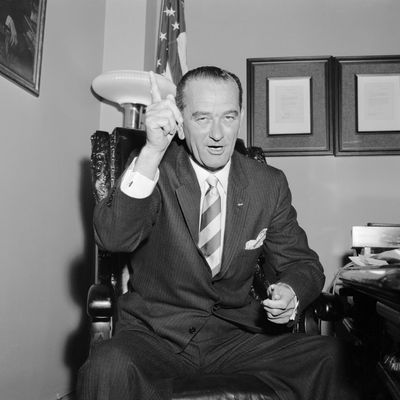
The brouhaha over Bernie Sanders’s hospitalization for heart disease and his brief surgery to install two stents to deal with a blockage created a lot of confusion. And a lot of the talk was less about Sanders’s heart trouble than about his age, and how the incident might remind journalists and voters alike of the septuagenarians (Joe Biden and Elizabeth Warren as well as Sanders) occupying the first, second, and third positions in all the national polls.
But for the record, it’s important to understand that this is hardly the first time someone on the path toward, or occupying, the White House has had a heart attack or some equally serious health condition. Two complicating factors are the evolving treatments that have made some once-feared diseases manageable, or at least non-life-threatening, and, just as important, how easy it used to be for candidates and presidents alike to hide health problems. John F. Kennedy, to cite one well-known example, was diagnosed with Addison’s Disease in 1947, an ailment that can cause acute pain and involve dangerous medications. That was five years before his first statewide campaign and 13 years before his presidential campaign. As the Los Angeles Times noted a few years ago, it was kept a secret at least until after he was inaugurated:
Hard though it is to believe these days – when a celebrity’s smallest sneeze is analyzed – Kennedy’s family and advisors were able to keep his medical history virtually secret. Kennedy, at 43 the youngest president ever elected, was portrayed as healthy and vibrant. In reality, he suffered various problems controlled by a daily regimen of steroids and other drugs.
Kennedy’s predecessor, Dwight D. Eisenhower, had a lot of serious health issues, as Healthline explains:
Eisenhower instructed his press secretary to inform the public of his condition after his heart attack in 1955. Six months before the election of 1956, Eisenhower was diagnosed with Crohn’s disease and underwent surgery, from which he recovered. One year later, the president had a mild stroke, which he was able to overcome.
And Lyndon Johnson had what was by all accounts a severe heart attack the same year as Ike’s, in 1955, when he was only 47. Despite his duties as Senate Majority Leader, Johnson was hospitalized for more than a month and didn’t return to Washington for several months after that. He had at least two more heart attacks, the last one fatal, after leaving the White House.
Dick Cheney, who never ran for president but was on the campaign trail twice as George W. Bush’s running mate and was, as the saying goes, a “heartbeat from the presidency” for eight years, had a history of heart disease even more extensive than Johnson’s, suffering his first heart attack at 37 in 1978, and three more before becoming vice-president. He subsequently had another heart attack shortly after leaving office, and then had a heart transplant in 2012.
Only one president died of heart disease while in office: Warren G. Harding.
But a number of presidents have had heart problems shortly after leaving office, including most recently Bill Clinton (quadruple-bypass surgery) and George W. Bush (a stent).
Other presidents have had other deadly ailments, ranging from the paralytic strokes that debilitated Woodrow Wilson during his second term to the prostate and skin cancers for which Ronald Reagan underwent operations during his second term. Unlike these, some medical conditions were well known at the time, most obviously the polio that confined Franklin D. Roosevelt to a wheelchair long before he ran for president.
As the FDR example illustrates, sometimes a successful battle against health conditions can become a symbol of courage and perseverance. Transparency about such conditions definitely helps: A previously hidden history of mental-health treatments suddenly destroyed the 1972 vice-presidential candidacy of Thomas Eagleton practically before it started. Indeed, that experience led to what has become an ever-more-elaborate vetting process for presidential and vice-presidential candidates in the ensuing years.
How voters might react to a serious health condition might also depend on the factors usually lumped under the term “lifestyle choices.” When LBJ had his first heart attack, he was a three-pack-a-day cigarette smoker. He quit coffin nails after nearly dying but never shed being a workaholic and fried-food addict. Given today’s diagnosis and treatment advances, a mild heart attack and a couple of stents should hardly be alarming, but the more a candidate can reassure voters he or she isn’t working or playing him- or herself into the grave, the better.






























